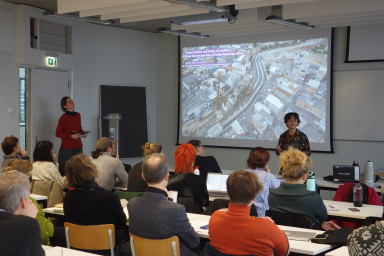10 Jan, 2024, 10:00Room 2.104, HCU
Prof. Dr. Ana Paula Koury (São Judas Tadeu University and Mackenzie University in São Paulo)
Urban futures and fields of conflict from the perspective of South American cities

Image © Renato Anelli.
Abstract
Large and precarious urban settlements, commonly referred to as favelas, barriadas, villas misérias, or other regionally specific names, serve as the primary battlegrounds for social and environmental conflicts in Latin American cities. Brazil’s favelas concentrate the highest population densities, infant mortality rates, and proportion of Afro-Brazilian residents, as well as the lowest employment rates, life expectancy, and green areas.
The absence of a consolidated urban infrastructure in these conflict-ridden territories also presents an opportunity for a sustainable future for the city, to foster social and environmental equality. Despite São Paulo’s participation in the Open Government Partnership (OGP) and its numerous agreements to support the transition to sustainability, the urgent need to complete the urban system in these areas has been addressed in a traditional manner.
The incomplete urban system in the peripheral areas of São Paulo is being developed through grey infrastructure and its associated political economy. The methods of conventional city development and the proposals for a sustainable future are currently in contestation within these conflict-ridden territories. We will present the case of the Ribeirão do Lageado Watershed as an example of the ongoing production of Brazilian peripheral urban infrastructure.
This case study reveals significant bottlenecks in implementing environmental policy in the city of São Paulo. It also offers insights that could contribute to reviewing the implementation of international policies on this issue.
About the lecturer
Ana Paula Koury is a professor of theory and history of urban planning at the Graduate Program at São Judas Tadeu University and Mackenzie University in São Paulo. She has led the Itaim Paulista Lab in São Paulo since 2016.